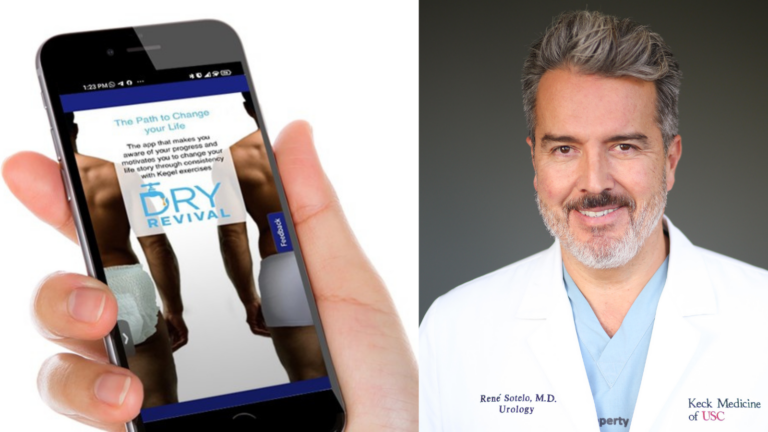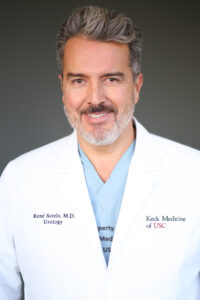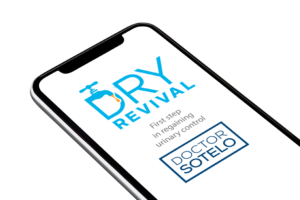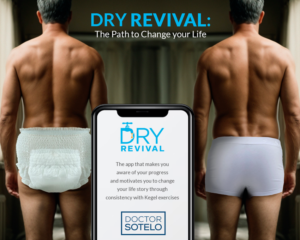
“Opening paths to health is my passion,” Sotelo says. “And helping patients tell their best stories about wellness is my best story.”
Staying atop the medical profession requires constant learning, especially if you serve on the faculty of a major academic medical center in addition to being a committed healthcare provider. For Rene Sotelo, MD — a renowned surgeon, researcher and professor of urology at the Keck School of Medicine of USC — that continuing education included earning a Master of Science in Digital Media Management (MSDMM).
With digital technology becoming an ever larger part of our lives in our internet-connected world, the MSDMM attracts professionals from almost every field. Sotelo signed up for the program, offered online by the USC Annenberg School for Communication and Journalism, to spread vital knowledge about urological health.
His MSDDM capstone project aimed not only to educate but also to empower. Through the program, Sotelo created the Dry Revival App to help people who have undergone urological surgery — including for such dangerous conditions as prostate, kidney and bladder cancer — to take control of their recovery.
Available for free from the Apple App Store and Google Play, Dry Revival enables people to track their progress in using Kegel exercises to strengthen their pelvic floor. Strong pelvic floor muscles are vital to stopping urinary incontinence, but urological surgery can weaken them. Other circumstances that can reduce their strength include pregnancy, aging and being overweight, so the Dry Revival App is designed to support a wide range of people with a boost toward better health.
The app also allows easy monitoring of water intake. It then processes the accumulated data into simple-to-understand charts so individuals can see exactly where they are in their journey of healing — all while protecting user privacy.
While there have been other digital guides and measures of urinary health, Dry Revival is the only one that provides feedback and positive reinforcement, according to its creator. The MSDMM program allowed the opportunity “to understand what was already out there and how the concept could be perfected,” Sotelo says.
Sotelo has already received numerous positive responses about the app’s effectiveness. “The app has helped most of my patients recover continence quickly after surgery,” he observes.
As a USC faculty member himself, Sotelo appreciated the coaching of his MSDMM instructors, including Colin Doty, Stylés Akira and Program Director Joseph Itaya. “They were constantly stimulating me to move forward,” he says. “They invited me to recognize that there are many possible answers.”
Doty, he says, “made us think outside the box,” while Akira “further awakened my fascination with advertising and ways to communicate and connect.” And Itaya, Sotelo explains, “definitively and most profoundly marked why brands are about emotions and why the best stories of my patients can be told when I can develop the best urological education to impact their lives.”
Itaya’s observations provided a special spark because, Sotelo notes, medicine and marketing have something in common: people. “Emotions are present in both cases,” he says — “either because you reassure patients while answering their life situation, or because you move them emotionally to sell an idea, product or service.”
In addition to real-world projects and faculty expertise, MSDMM students learn from and spur each other on. “The professors encourage everyone to contribute,” says Sotelo, who enjoyed classmates’ analyses of his presentations — just as they, in turn, benefited from his input.
Sotelo also found advantages in the diverse backgrounds and experiences of his cohort. “I truly appreciated the cultural and generational differences,” Sotelo recalls. “As a Latino and more advanced in age than most of my classmates, I was always welcomed and respected.”
Although he is a renowned expert in robotic surgery, Sotelo’s technological expertise did not encompass the range of digital communication platforms — that is, until he entered the MSDMM program. “I felt their patience in helping me master specific tools,” he says of the faculty and his fellow students.
While that mentorship proved essential in crafting his Dry Revival App, Sotelo also found it valuable in other areas of his health-focused mission. “The program helped me reinforce the educational tools on which I rely to better reach my followers,” he says. This included applying its tips to enhancing the content of his vodcasts and website. MSDMM courses also helped Sotelo strengthen his already significant social media presence, which includes TikTok, YouTube and X (formerly Twitter).

Image courtesy of Dr. Rene Sotelo
He found the program’s virtual format to be advantageous as well. Between research, teaching and caring for patients, Sotelo carries a packed schedule, so he appreciated the program’s flexible, online format.
“At first, it was a challenge,” he notes of balancing his MSDMM studies with the rest of his workload. But with the support of his family, he made the adjustment quickly, he adds. “My weekends were dedicated to reading and working on the assignments.”
Beyond the program’s training in production, analytics and other key areas, Sotelo also drew creative inspiration from the MSDMM. That’s key, because compelling storytelling is essential to marketing — especially in a digital age with seemingly endless competitors for our attention.
Through Dry Revival, Sotelo inspires people to change their own stories by making Kegel exercises essential to their personal narratives of full recovery. He hopes that urological patients everywhere will embrace the app as part of their personal healthcare journey.
“Opening paths to health is my passion,” Sotelo says. “And helping patients tell their best stories about wellness is my best story.”





